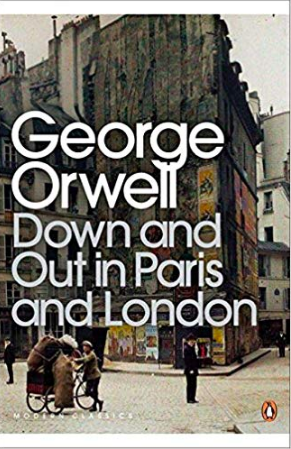Get on my page: End of summer reading list
I usually stick to classics, but lately I've been branching out so here's what I've read this summer, from short horror stories to a novel about mysterious deaths in a small town to a semi-autobiographical account of George Orwell's life in poverty.
1. 1491: New Revelations of the Americas Before Columbus by Charles C. Mann
This book relies on Mann's effortless storytelling abilities and his own research, as well as common theories about what the Americas were like before colonization. The scientific evidence is still debated, but Mann's analysis and summary of certain subjects—population, agriculture, etc—is comprehensive and interesting. Mann offers his arguments showing how the New World that Europeans "discovered" was complex, clean, vastly populated, and ruled by distinct leaders. There is (almost unanimous) agreement of certain facts, like how people living in the Americas before Columbus spoke differing languages, and had various religions and cultures based on where they were situated. I learned a lot from this historical read. One fact I found intriguing was that horses were brought to the Americas by Europeans in the 16th century, thus making the stereotypical image of "Indians" on horseback more of a Hollywood invention than solid fact. "As for the horses," writes Mann, "they were from Europe; except for llamas in the Andes, the Western Hemisphere had no beasts of burden." I highly recommend this read if you like historical anecdotes mixed with research. Even though the book was first published in 2005, Mann prefaces the second edition with some updated notes and comments.
2. Down and Out in Paris and London by George Orwell
George Orwell's debut book is a memoir about the ups and downs of his life in Paris and London in the late 1920s, working at seedy hotels and kitchens and living a meagre but meaningful existence. He brings the reader into the world of "spikes" (prison-like homeless shelters), lodging houses and slums, eating bread and margarine and tea, always scrounging for tobacco, trudging from place to place with vagrants along the way—more like zombie cattle than humans. Orwell tells heart-wrenching stories that both shocked and enraged me about all kinds of people he met—artists, murderers, worse. He gives a thorough explanation of how poverty destroys or makes the man. This is a solid read for anyone looking for another Orwell book to add to their collection.
“It is worth saying something about the social position of beggars, for when one has consorted with them, and found that they are ordinary human beings, one cannot help being struck by the curious attitude that society takes towards them. People seem to feel that there is some essential difference between beggars and ordinary ‘working’ men”
3. The Call of Cthulhu and Other Weird Stories by H.P. Lovecraft
This book is a collection of short stories by the master of psychological horror, H.P. Lovecraft. It includes his classics, like Dagon, Nyarlathotep and Facts Concerning the Late Arthur Jermyn and His Family, which are written in a poetic style, but harbour eerie and sinister subjects like suggested bestiality, dark magic and suicide. His stories shock unlike others that use pure gore and violence to entice readers. Lovecraft's stories are twisted and unusual, intricate and repulsive. I recommend this collection of short stories as an introduction to Lovecraft's writing because it contains so many of his popular and interesting short stories (and they are actually short so it's a quick read.)
4. We Have Always Lived in the Castle by Shirley Jackson
I wrote an in-depth essay about this Shirley Jackson favourite, but I thought I would mention it here because it's the perfect summer read for cynics—like myself. The book is narrated by 18-year-old Merricat Blackwood, years after the mysterious poisoning deaths of her immediate family. Her sister was the only one left unscathed and her surviving uncle was disabled by the incident. The two sisters and uncle live apart from their small-town community. It's rare to find a book with such a strong, quirky and menacing narrator, especially an 18-year-old woman. She is unapologetic and vengeful, but genuine. The narrator is both the hero and the anti-hero. She illustrates the struggles of her family and the bond of sisterhood. The story itself is also unusual, but has a magical element. If you like dark humour, sarcasm and twisted plots—this one's for you.
Next up on my list: The Westing Game by Ellen Raskin
Find me on Goodreads and start a reading challenge for this year.







